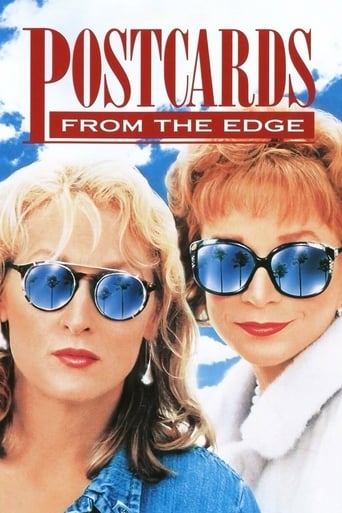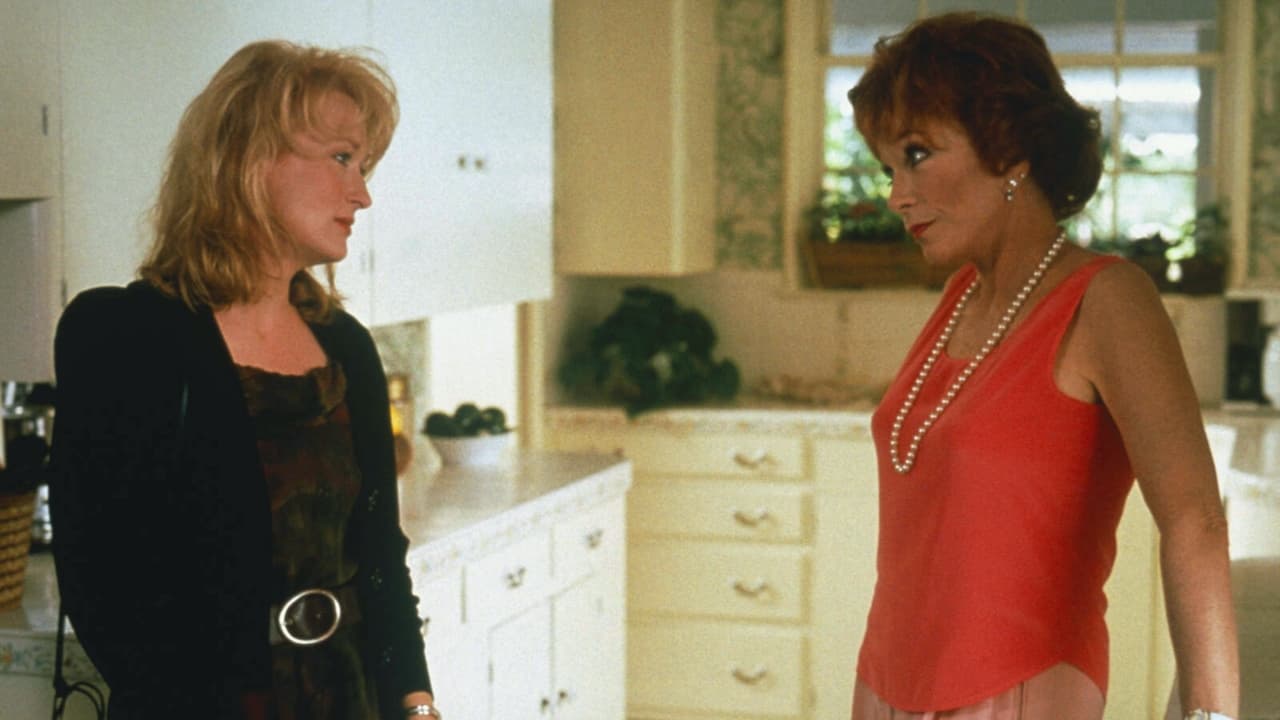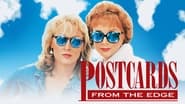Blake Peterson
Meryl Streep can be the villain, the hero, the sister, the daughter, the mother, the spirit, the icon. In Postcards from the Edge, however, she is a flat out mess. Streep portrays Suzanne Vale, a successful actress who is about to hit the post-I Know Who Killed Me Lindsay Lohan stage of her career. She relies on cocaine just to get through the day. She partakes in casual affairs she doesn't remember the next day. She is like a robot, barely able to function in her daily job. She doesn't want to hurt anybody, but her habits are about to.Suzanne is finally given a wake-up call when she accidentally overdoses on a deadly mix of narcotics. After getting her stomach pumped, she ends up in rehab, struggling to piece her life back together. But her shaky mind begins to rattle even more when her mother, Doris Mann (Shirley MacLaine), arrives on the scene. Doris is not just Suzanne's mother; she is a celebrated legend, a symbol of the '50s/'60s era of Hollywood musicals.Doris means well, but she's possibly too self-centered for her own good. When she throws Suzanne a "welcome-home" party, she opens the front door, mugs for the varying cameras, and, with dramatic emphasis, declares, "My baby is home!" When the party is hitting its last legs, she pressures Suzanne to sing in front of everybody. Yet, the second her daughter finishes, she pulls one of those don't-make-me-sing (wink!) acts and one- ups her without even realizing that it may be just a little bitchy.The rehab clinic advises that Suzanne live with Doris in order to have someone constantly watching her, but that probably isn't a good idea. Whether she'd like to admit it or not, Doris is an addict herself, popping champagne in the early hours of the morning or mixing in an absurd amount of vodka into her fruit smoothies. Within the important first months of Suzanne's recovery, the mother/daughter dynamic is challenged after years of repressed emotions and unexpressed opinions.Postcards from the Edge originally began as an autobiographical novel by Princess Leia herself, the self-deprecating Carrie Fisher. As a film (which was also penned by Fisher), it contains a darkly funny sting. Deeply rooted in time-to-get-my-life-together reality and over-the-top, Norma Desmond-like expression, it's a comedy that is solidly entertaining but also bitterly true. One can only wonder how much of the film is lifted directly from the lives of Fisher and her famous mother, the inimitable Debbie Reynolds.Mike Nichols has made movies that range from profoundly moving to breezily humorous, and Postcards from the Edge lands somewhere in the middle. It isn't as vigorously thought-provoking as many of his other undertakings, but it captures the mindset that, no matter how terrible life is, you can always find the laughter in it. Surely, Doris' diva attitude is sickening to the long-suffering Suzanne, but we see the events through Nichols' eyes. We're laughing, uncomfortably of course, but there's also unrelenting sympathy for both Suzanne and Doris. Suzanne has never lived a day without stooping under Doris' grand shadow, and Doris has never been able to meet the expectations of her ever-grumbling mother (Mary Wickes). Nichols films these women through a comedic lens, but there's an underlying anguish that he captures with enrichment.If Postcards from the Edge is more scathing than it is meaningful, we have Streep, MacLaine, and Fisher to thank for all of its successes. Streep and MacLaine immerse themselves in their roles, understanding the women they're playing with unforced ease, while Fisher's screenplay contains absolutely scintillating dialogue. It isn't without its faults, but Postcards from the Edge rarely misses the mark.Read more at petersonreviews.com
Lechuguilla
The first five minutes are fine. And the film's eight-minute musical finale exudes terrific country/western spirit. But, in between, the characters reek of a glossy shallowness characteristic of a script that is not well fleshed out.Flighty, ungrateful Suzanne Vale (Meryl Streep) is a young actress hooked on drugs, and lorded over by her annoyingly controlling, alcoholic, show-biz mother named Doris Mann (Shirley MacLaine). Their bumpy relationship provides the main thrust to the plot, as pill-popping Suzanne tries to continue her acting, while judgmental Doris imposes herself on Suzanne, as a kind of career counselor. Around these two swirl an assortment of photogenic Hollywood types, who initiate or aggravate various conflicts between Suzanne and Doris.One would think this setup would imply a drama. Not here. The film tries to be a comedy. Some of the dialogue is indeed funny. But the comedy element contradicts the painful plight of the script's two main characters. In addition to their substance abuse problems, both Suzanne and Doris are so wrapped up in themselves, so self-centered, they're hard to root for.The film's acting generally is overdone, at times hammy, the most egregious example being Dennis Quaid. Production design is credible. Color cinematography is conventional, but competent.The story premise had merit. But Director Mike Nichols and writer Carrie Fisher needed to give a little more thought to the characters in this story, all of whom come across as glib, shallow, cosmetic, superficial, devoid of depth. Comedy can indeed be integrated with serious topics. But in the case of "Postcards From The Edge", it needed to be integrated with a little more finesse.
James Hitchcock
"Postcards from the Edge" represents one of Hollywood's occasional attempts to turn its cameras on itself by making a film about films and film-making. The central character is Suzanne Vale, a drug-addicted actress who is the daughter of Doris Mann, a leading cinema actress of the 1950s and 1960s. It is based on a novel by Carrie Fisher, an actress who at one time suffered from drug addiction and is the daughter of Debbie Reynolds, a leading cinema actress of the 1950s and 1960s. Despite these similarities, Fisher has denied that her novel was autobiographical. (Some, including Minnelli herself, have also seen parallels with Liza Minnelli and Judy Garland).The main theme of the film is the relationship between mother and daughter. Suzanne's drug habits have been affecting her career and even after treatment in a rehab centre she is warned that the studio's insurance policy will cover her only if she lives with a "responsible" individual, such as her mother. Suzanne, however, finds it difficult to live with Doris, who is about as irresponsible an individual as they come, and has her own substance dependence problems, in her case with alcohol. Doris is loud, selfish and manipulative, never missing a chance to interfere in Suzanne's life. There is also a sub-plot about Suzanne's relationship with movie producer Jack Faulkner, who professes passionate love for her on their first date, which she believes until she discovers that he is also sleeping with one of her co-stars in her latest picture.I watched this film largely because it stars Meryl Streep, one of my favourite actresses, and she is the best thing about it, even if I would not rate her performance quite as highly as the one she gave in "Silkwood", her earlier collaboration with Mike Nichols. (I have never seen "Heartburn", another film on which they worked together). Meryl even manages to do something which I would have thought beyond the capabilities of a first-rate actress- to give a convincing impersonation of a second-rate one. It is clear from the scenes where she is shooting her movie that Suzanne Vale is not meant to be an actress in the Meryl Streep class. Streep even gets to sing, and shows us that at one time she had a far better voice than the one she displayed in last year's awful "Mamma Mia!". I wondered what has happened to it over the last couple of decades.I also liked Shirley MacLaine as Doris, which is strange as I disliked her in "Terms of Endearment", another film in which she played a domineering mother who interferes in her daughter's life. I think that the difference is that her performance as Aurora in "Terms of Endearment" was such an over-the-top caricature that it seemed quite out of place in that lugubrious tearjerker. Her performance in "Postcards from the Edge" is no less a caricature, but then the film is less serious and lighter in spirit than "Terms of Endearment", and Doris is written as the sort of larger-than-life character who is such a drama queen, offstage as well as on, that her whole life almost becomes a deliberate self-caricature. It is the two women who are at the centre of the film, but there are also cameos from three major male stars, Dennis Quaid as Jack, Gene Hackman as a film director and Richard Dreyfuss as Suzanne's doctor, who also seems to be romantically interested in her.What I didn't like about the film was that it was, at times, too static and that it never finished what it seemed to be starting. It starts off as what seems to be a serious film about drug addiction, but this theme is never really developed. It then turns into a satire on the ways of Hollywood, but this theme is not developed either, and the film then becomes a study of a mother-daughter relationship, without approaching that subject too seriously. It has been described as a comedy, although I am not sure that is the right description if by "comedy" is meant a film primarily intended to make people laugh. (I doubt if many of the lines in "Postcards from the Edge" would have had audiences rolling in the aisles). It is a film notable for two good acting performances, but it never seems to know where it is going or what it is supposed to be saying. 6/10
gcd70
"Postcards From the Edge" is a very funny movie, based on the biting novel by Carrie Fisher, about the pressures of being the child of a show business star.Director Mike Nichols is in top form as is Meryl Streep and an amazing supporting cast that includes Shirley McClaine, Gene Hackman, Richard Dreyfuss and Dennis Quaid.The movie is really quite short, and, to be honest, not a lot actually happens. In spite of this, it is thoroughly entertaining and a mighty good laugh. Owes a lot to the insightful, honest writing from Fisher's novel of the same name which was followed by two thematic sequels.Friday, March 1, 1991 - Forest Hill Chase



 AD
AD




